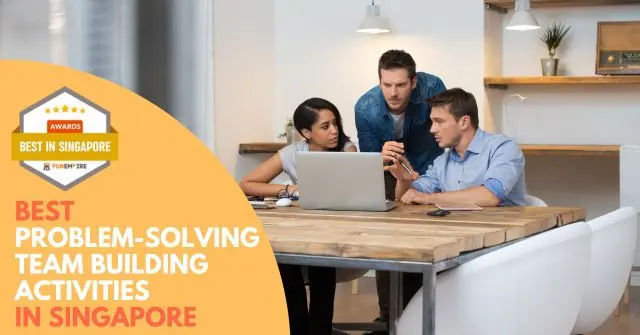Problem Solving Team Building Singapore

The business world is fast paced where a team which is flexible and collaborative is the key to solving problems in no time.
Amazing Race, Giant Board Games, Laser Tag, Pool Ball and Escape Room are best team building activities to enhance problem solving skill in Singapore.
When choosing a problem solving team building activity in Singapore, remember to refer to the team goals, number of participants, budget, physical ability and venue.
These provide opportunities for members of the team to work together, share their ideas and engage in critical and creative thinking in a stimulating and engaging way.
This article highlights the best corporate team building activities that are specifically designed for making the team members to solve problem in Singapore.
Quick Summary
- Best team building activities to improve problem-solving skills in Singapore include Amazing Race, Giant Board Games, Laser Tag, Pool Ball, and Escape Room.
- Factors to consider while selecting a team-building activity to improve problem solving include team objectives, size of the group, budget, physical capabilities and location.
- For teams, these activities provide a chance to work together, communicate, think critically and creatively in an enjoyable and relaxed way.
Key Consideration Factors
When choosing a team bonding activity for problem-solving in Singapore, You need to keep these points in mind:
- Team Objectives: What goals do you hope to achieve by doing this team building exercise? Is it to enhance communication? Problem solving? Creativity? Knowing what you want to get out of the activity will help you choose the right activity.
- Group Size: The number of people will sometimes dictate what activities will work (some activities are better suited for a small group, others to a larger group).
- Budget Constraints: Make sure you are aware of your budget before exploring team building events. Whether it is a two hour activity or a 2D1N retreat, your budget will definitely limit your options in Singapore.
- Physical restrictions: Think about any physical restrictions of team members. To make activities inclusive, they should be accommodating so that everyone can participate without feeling left out or stressed.
- Location and Logistics: When considering something at night, these become imperative to consider. Take into account factors such as where you live in a city-state such as Singapore and how long it would take for you to get there, how you would transverse to get there if relevant, and whether there are any special requirements for getting to this activity.
Best Team Building Activities to Improve Problem-Solving Skills in Singapore
1. Amazing Race – Merlion Feast @ Chinatown
.webp/tr:w-500)
| Group Size | 8 Pax – Unlimited Pax |
| Price | From $38 per pax |
| Duration | 2.5 Hours Gameplay + 30 mins set up & de-brief |
| Activity Type | Outdoor |
| Website | www.funempire.com/amazing-race/ |
The Merlion Feast in Chinatown by FunEmpire wasn’t just a game—it was a memorable team-building experience filled with culture, competition, and camaraderie.
Chinatown’s historic sights provided the backdrop for this interactive race, where we used both physical and digital clues to solve a mystery. The real-time chatbot support acted as our trusty guide, while the live leaderboard kept the competition friendly and lively.
At each checkpoint, we could redeem snacks and prizes, giving us something to celebrate and energize us as we worked together to uncover clues. It was truly a unique way to experience Singapore and come together as a team.
2. Amazing Race – Escape From Pulau Belakang Mati @ Sentosa

| Group Size | 8 Pax – Unlimited Pax |
| Price | From $38 per pax |
| Duration | 2.5 Hours Gameplay + 30 mins set up & de-brief |
| Activity Type | Outdoor |
| Website | www.funempire.com/amazing-race/ |
FunEmpire’s Escape From Pulau Belakang Mati at Sentosa delivered a perfect mix of physical and digital challenges, creating an engaging hybrid experience. Immersed in Sentosa’s rich history, our team journeyed through the island, tackling clever puzzles that demanded teamwork and quick thinking.
The real-time chatbot support kept us connected and offered instant hints, making sure the flow was smooth and everyone was involved. A live leaderboard added that competitive spark, with points and rankings updating in real-time, while snacks and rewards at checkpoints kept us energized and motivated.
This activity shines as a team-building experience, bringing together groups of any size and strengthening team bonds. The thrill of navigating Fort Siloso added urgency to our mission, challenging us to work together to solve puzzles, avoid virtual guards, and push our problem-solving skills to new heights.
FunEmpire’s Amazing Race at Sentosa goes beyond the typical team-building activity—it’s a thrilling journey of culture and challenge, easily one of the top choices for team bonding in Singapore.
3. Amazing Race – Marina Murder Mystery @ Gardens By The Bay

| Group Size | 8 Pax – Unlimited Pax |
| Price | From $38 per pax |
| Duration | 2.5 Hours Gameplay + 30 mins set up & de-brief |
| Activity Type | Outdoor |
| Website | www.funempire.com/amazing-race/ |
FunEmpire’s Amazing Race Marina Murder Mystery has to be one of the most remarkable team-building activities I’ve been part of in Singapore.
Picture exploring the iconic Gardens by the Bay and Marina Bay while being drawn into a murder mystery. You’re not just sightseeing—you’re on a mission to uncover the truth behind the untimely death of a wealthy pop star.
The Real-Time Chatbot Support made all the difference, providing instant hints and guidance to keep us on track and fully immersed in the experience. This interactive feature added a new layer of engagement, helping our team communicate and strategize to solve each puzzle in our way.
A live Leaderboard displayed our progress, adding a dose of friendly competition, while rewards at checkpoints gave us a fun, motivational boost. We could redeem snacks and small treats, which kept us energized and ready to solve the next clue.
This wasn’t just a game—it was an adventure that tested our teamwork and brought out our problem-solving skills in real-time. Every solved puzzle felt like a shared win, strengthening our connection as a team.
If you’re looking to explore Singapore with a thrilling twist of adventure, collaboration, and intrigue, this experience is unbeatable. It’s a team-building event that leaves a lasting impression. Are you up for the Marina Murder Mystery challenge?
4. Grand Buffet Mystery

| Team Size | 5 Pax – Unlimited Pax |
| Price | $30 per pax |
| Duration | 45 minutes to 1 hour |
| Activity Type | Indoor |
| Website | www.funempire.com/grand-buffet-mystery |
Who says buffets have to be boring? With The Grand Buffet Mystery, your guests can enjoy more than just great food — they’ll also team up to crack the case of the missing Master Chef! This self-guided adventure is packed with fun puzzles, tech twists, and a real-time leaderboard for a little friendly competition. Whether it’s a work party, team celebration, or family dinner, it’s the perfect way to mix laughs, brainpower, and tasty bites into one amazing experience.
5. Escape Room

| Group Size | 4 Pax – Unlimited Pax |
| Price | From $28/Pax |
| Duration | 1 Hour Gameplay + 30 Mins Set Up & De-Brief |
| Activity Type | In-person and Virtual game options available |
| Where To Book | www.funempire.com/escape-room/ |
Escape rooms in Singapore are a popular adventure activity in which teams are locked in a specially themed room, with the objective to escape within a stipulated time by solving a series of puzzles. The activity refreshes and helps develop a wide array of skills from critical thinking to teamwork.
Benefits:
- Sharpens critical thinking and enhances problem-solving under time constraints.
- Improves teamwork and effective communication as participants work closely to uncover clues.
- Encourages personal and professional growth.
Client Testimonial
Our team had a fantastic time at FunEmpire’s Time Travel themed Escape game! A big thank you for providing the perfect setting for our corporate team building event, and our facilitator made it even more enjoyable with their guidance!
SARAH D.
6. Giant Board Games

| Group Size | No Minimum Pax |
| Price | From $15 per person |
| Duration | 1 to 2 hours |
| Activity Type | Indoor and Outdoor options available |
| Where To Book | www.funempire.com/giant-board-games/ |
Giant Board Games, as illustrated by the life-sized chess and checkers, involve teams working together to formulate strategies and anticipate their enemies’ moves, which is an exercise to hone strategy and problem-solving skills.
Benefits:
- Promotes team strategy development.
- Improves spatial awareness and tactical thinking.
Client Testimonial
Had fun with the games conducted at site with The Cage@Kallang. Amazed with the giant UNO cards, giant Jenga and giant dice for Snakes and Ladder. Instructions given were clear and straightforward from the facilitators. Would have been better if they are able to drive us with enthusiasm from their energy and to manage the change in teams/opponents to match-up for the scores.
Pearlyn เพิรล์ลิน
Check out Giant Board Games here
7. Laser Tag

| Group Size | 6 Pax – Unlimited Pax |
| Price | From $25/Pax |
| Duration | 1 to 2 hours |
| Activity Type | Indoor and Outdoor options available |
| Where To Book | www.funempire.com/laser-tag/ |
Laser tag involves movement between two teams and a set course, or arena. The players tag each other using lasers. This type of action is a fast-paced game requiring players to think quickly and solve problems under time pressure.
Benefits:
- Develops quick reflexes and enhances decision-making under pressure.
- Strengthens communication and teamwork in a high-energy environment.
Client Testimonial
10 out of 10! I would definitely recommend FunEmpire!
Hawksford
8. Poolball

| Group Size | 8 Pax – Unlimited Pax |
| Price | From $20 per person |
| Duration | 1 Hour Gameplay |
| Activity Type | Indoor and Outdoor options available |
| Where To Book | www.funempire.com/poolball/ |
Poolball involves kicking footballs into pockets on a giant pool table – a mixture of pool and football involving coordination, planning and problem-solving to score more than your opponent.
Benefits:
- Boosts team spirit, coordination and team collaboration among team members.
- Encourages creative problem-solving and precision.
Client Testimonial
Poolball helped us to know our colleagues better!
Prudential
Implementation Tips
To successfully implement these activities, consider the following steps:
- Choose the Appropriate Activity: Pick an event for your party’s size, dynamics and skills.
- Prepare thoughtfully: Get all the logistics right, so everyone can focus on enjoying the experience.
- Facilitate and Debrief: Have a facilitator guide the exercises and debrief at the end to discuss learnings and experiences.
Problem Solving Team Building Singapore
These problem-solving team building activities Singapore can be a great addition to your corporate routine because they can help improve the productivity and efficiency of your team.
The activities listed above are fun to play while being designed for participants to stretch and enhance their problem-solving abilities. These team building games are perfect for teams in Singapore to improve their productivity and problem-solving skills.
Whether it’s planning a strategy in Giant Board Games or cracking codes in an Escape Room, these activities offer different team building benefits and learning opportunities that help build a more harmonious and productive team.
Check out some of our other related articles and guides below:
- Best Team Building Activities In Singapore (2025)
- Best Effective Team Management Strategies in Singapore (2025)
- Best Team Building Skills in Singapore for Effective Performance (2025)
- Best Communication Team Building Activities Singapore (2025)
- Best Leadership Team Building Activities Singapore (2025)
Frequently Asked Questions (FAQ)
If you have any questions about team building activities to improve problem-solving skills in Singapore, you can refer to the frequently asked questions (FAQ) about the best Problem-Solving Team Building Activities in Singapore below:
What are the best team building activities to improve problem-solving skills in Singapore?
The best team bonding activities to improve problem-solving skills in Singapore include Amazing Race, Giant Board Games, Laser Tag, Pool Ball, culinary team building workshops, and Escape Room.
How often should we conduct team building activities?
Ideally, team building activities Singapore should be conducted at least once a quarter to keep the team engaged, foster continuous improvement in teamwork skills, and integrate new members into the team effectively. However, the frequency can vary depending on the company’s schedule, budget, and team dynamics.
Are these activities suitable for large teams?
Yes, activities like the Amazing Race, Giant Board Games, and Laser Tag can be adapted for large groups by increasing the number of participants in each team or by having multiple team building sessions. This flexibility ensures that everyone can participate and benefit from the experience.
Can these activities be customized according to specific team issues?
Yes, many team building activity providers in Singapore offer customization options to address specific team dynamics or challenges. For example, an escape room game can be tailored to focus more on communication hurdles or leadership skills depending on the team’s needs.
Also, there are virtual team building activities that are suited for remote teams to encourage healthy competition, promote teamwork, encourage creativity and critical thinking abilities, all within the comfort of their home.







